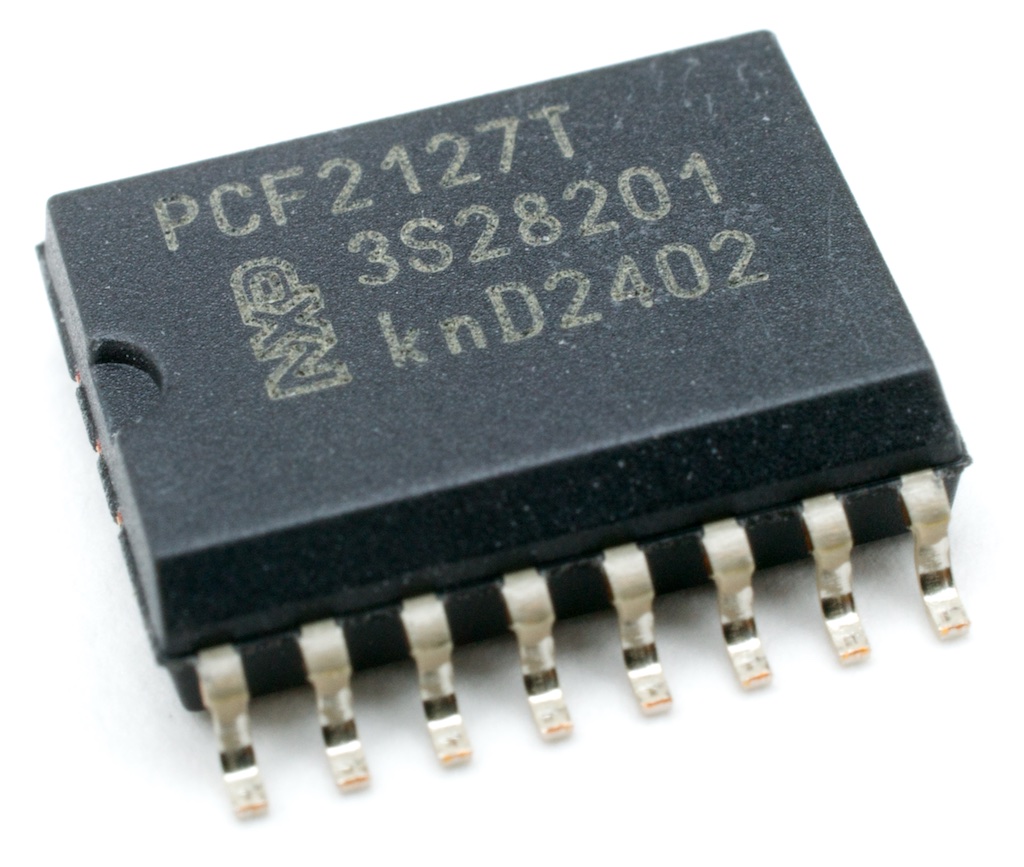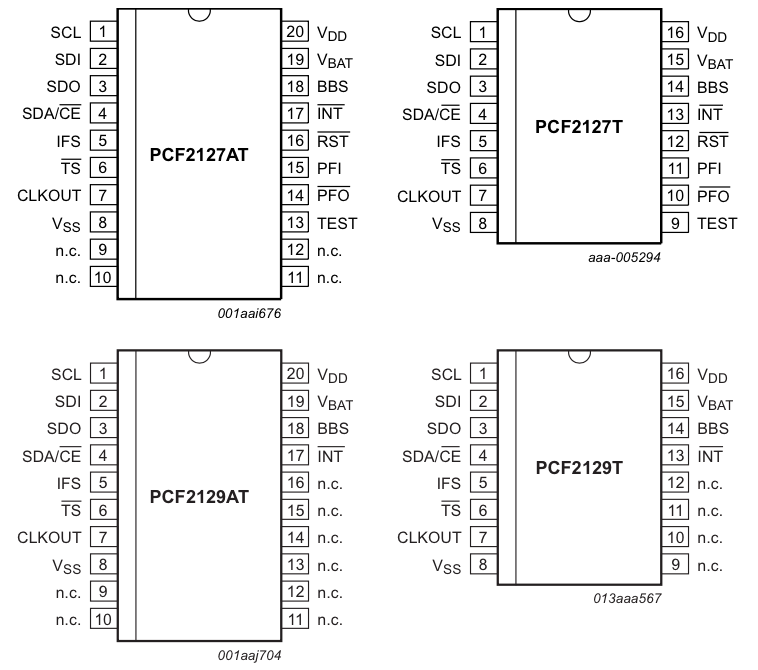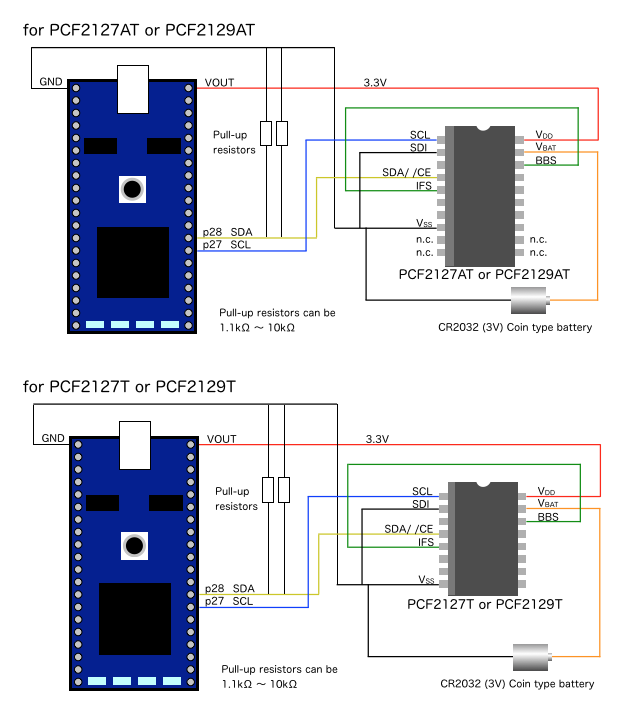PCF2127 and PCF2129 are high accuracy real-time-clock (RTC) module. This library provides simple interface to accessing clock information.
Dependents: PCF2127_Demo PCF2127_Hello
PCF2127 and PCF2129
 PCF2127T is in SO16 package
PCF2127T is in SO16 package
The PCF2127 and the PCF2129 are a CMOS Real Time Clock (RTC) and calendar with an integrated Temperature Compensated Crystal (Xtal) Oscillator (TCXO) and a 32.768 kHz quartz crystal optimized for very high accuracy and very low power consumption.
Both of PCF2127 and PCF2129 have a selectable I2C-bus or SPI-bus, a backup battery switch-over circuit, a programmable watchdog function, a timestamp function, and many other features.
On addition to this, the PCF2127 has 512 bytes of general-purpose static RAM.
These 4 types of RTC modules are software compatible. So this library "PCF2127" can be used all of those.
This library only supports I2C to communicate with the PCF2127/PCF2129.
Type variations
Main feature difference
| type | +/-3ppm accuracy range | 512 bytes RAM | package |
|---|---|---|---|
| PCF2127T | -30℃ to +80℃ | yes | SO16 |
| PCF2127AT | -30℃ to +60℃ | yes | SO20 |
| PCF2129T | -30℃ to +80℃ | not available | SO16 |
| PCF2129AT | -15℃ to +60℃ | not available | SO20 |
Pin assign


PCF2127T
Connection between MCU and PCF2127/PCF2129
These examples show how the RTC module can be connected via I2C bus.

References
- Datasheet
- User manual
- Other information PCF2127
Diff: PCF2127.cpp
- Revision:
- 2:db76c68f998f
- Parent:
- 1:700e0285cfd8
- Child:
- 3:e2a6ac61fcbd
diff -r 700e0285cfd8 -r db76c68f998f PCF2127.cpp
--- a/PCF2127.cpp Tue Dec 09 07:21:13 2014 +0000
+++ b/PCF2127.cpp Wed Dec 10 01:43:30 2014 +0000
@@ -2,8 +2,8 @@
* PCF2127 library
*
* @author Akifumi (Tedd) OKANO, NXP Semiconductors
- * @version 1.6
- * @date 09-Dec-2014
+ * @version 1.7
+ * @date 10-Dec-2014
*
* PCF2127 is a "real time clock (RTC)" module which is including a Xtal and TCXO
* http://www.nxp.com/products/interface_and_connectivity/real_time_clocks/rtcs_with_temp_compensation/series/PCF2127.html
@@ -42,12 +42,12 @@
{
char data[ 4 ];
int err;
-
+
data[ 0 ] = Control_1; // access start register address
data[ 1 ] = vControl_1;
data[ 2 ] = vControl_2;
data[ 3 ] = vControl_3;
-
+
err = i2c.write( device_address, data, sizeof( data ) );
err |= set_register( CLKOUT_ctl, vCLKOUT_ctl );
@@ -74,7 +74,7 @@
buf[ 7 ] = i2bcd( dtp->tm_year - 100 );
err = i2c.write( device_address, buf, 8 );
-
+
return ( err ? I2C_ACCESS_FAIL : NO_ERROR );
}
@@ -138,7 +138,7 @@
char v;
v = i2bcd( s );
-
+
return ( set_register( addr, v ) );
}
@@ -147,6 +147,46 @@
return ( set_register( Control_2, 0x00 ) );
}
+int PCF2127::RAM_write( int address, char *p, int size )
+{
+ char b[ size + 1 ];
+
+ b[ 0 ] = RAM_wrt_cmd;
+
+ for ( int i = 1; i <= size; i++ )
+ b[ i ] = *p++;
+
+ if ( set_RAM_address( address ) )
+ return ( I2C_ACCESS_FAIL );
+
+ return ( i2c.write( device_address, b, sizeof( b ) ) ? I2C_ACCESS_FAIL : NO_ERROR );
+}
+
+int PCF2127::RAM_read( int address, char *p, int size )
+{
+ char b = RAM_rd_cmd;
+
+ if ( set_RAM_address( address ) )
+ return ( I2C_ACCESS_FAIL );
+
+ if ( i2c.write( device_address, &b, 1 ) )
+ return ( I2C_ACCESS_FAIL );
+
+ return ( i2c.read( device_address, p, size ) ? I2C_ACCESS_FAIL : NO_ERROR );
+}
+
+
+int PCF2127::set_RAM_address( char address )
+{
+ char b[ 3 ];
+
+ b[ 0 ] = RAM_addr_MSB;
+ b[ 1 ] = (address >> 8) & 0x1;
+ b[ 2 ] = address & 0xFF;
+
+ return ( i2c.write( device_address, b, sizeof( b ) ) );
+}
+
int PCF2127::set_register( char addr, char data )
{
char b[ 2 ];
@@ -154,7 +194,7 @@
b[ 0 ] = addr;
b[ 1 ] = data;
- return ( i2c.write( device_address, b, 2 ) );
+ return ( i2c.write( device_address, b, sizeof( b ) ) );
}
int PCF2127::read_register( char addr )
 PCF2127 and PCF2129 High-accuracy RTC module
PCF2127 and PCF2129 High-accuracy RTC module